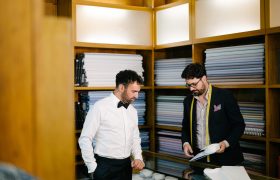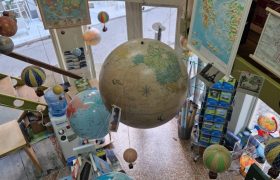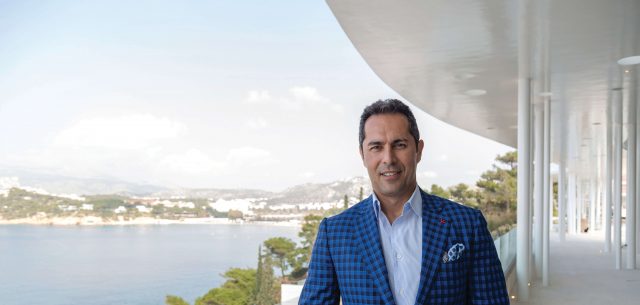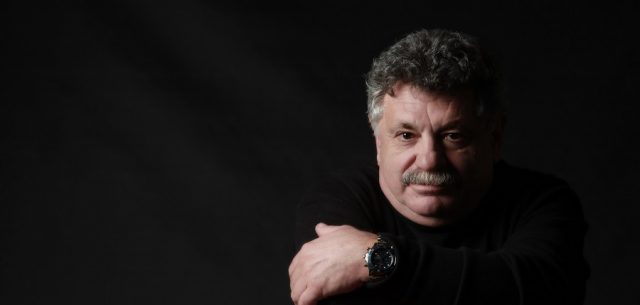When truth is far stranger than fiction
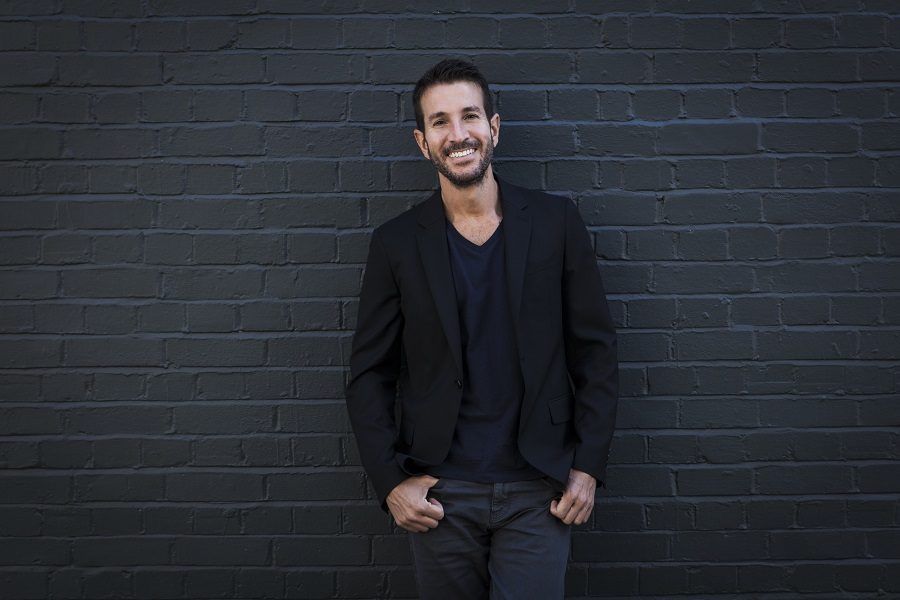
A grisly crime, a woman held hostage in her own mind, and a therapist determined to unravel her secrets – Alex Michaelides’ The Silent Patient is a riveting exploration of the maze-like psyches of the woman convicted of murdering her husband and the therapist determined to treat her. Michaelides peels the workings of a criminal mind layer by layer, in a tantalizingly slow peep show. Immersive and hypnotic from cover to cover, the film rights for the book have already been snapped up by Brad Pitt’s ‘Plan B’ company and will be produced by the Oscar-winning Jeremy Klein of ‘Moonlight’, and ‘12 Years a Slave’ fame. The foreign book rights have been sold in 43 countries, a record for a UK debut thriller. Elena Panayides, who schooled with Alex Michaelides, draws out the literary genius’ hopes and fears, and his own troubled relationship with psychotherapy in this raw, insightful conversation.
It’s not often that one of your high-school friends breaks publishing records for their debut fictional novel. I meet Alex in one of our favourite London spots, the art-deco Colony restaurant in the Beaumont hotel that serves American comfort food and cocktails in a retro-chic setting.
We take a corner red leather booth, under a myriad of black and white photos of classic figures from the stage, screen and letters. Alex has a young Noel Coward hovering over his head, while I feel Greta Garbo’s steely and sensual gaze upon me. It’s Sunday brunchtime, and we decide it’s as good a time as any for champagne and a long overdue catch-up. From our childhood days in Cyprus to this chilly February afternoon in London, it’s the perfect time to reflect, relish and project.
The Silent Patient, a gripping and compelling tale of Alicia Berenson, a happily married artist who murders her husband and never speaks again. Forensic psychotherapist Theo Faber sets out to unravel the mystery of Alicia’s notorious crime and quickly discovers that nothing about her case is as clear-cut as it seems.
Hardcover: 336 pages
Publisher: Celadon Books (February 5, 2019)
Language: English
You left Cyprus to go to University in the UK. What is it from Cyprus or from your formative years, that you carry with you?
I really enjoyed debating at the English School in Cyprus. I guess that prompted me to train as a screenwriter at the American Film Institute in Los Angeles. I had a Disney teacher who taught me, and he used to say: ‘the nice thing about being a writer is that you don’t have to come up with the witty response in 15 seconds. You can go away and spend a month thinking about dialogue and come up with something great.’
I took a lot of Cyprus with me when I went. At the time, I thought all teenagers were into Greek myths, I didn’t realise that was very location specific – being taught Homer at school or performing Antigone at 13 years old.
Then I went to Cambridge, and I did Greek Tragedy. I also did Greek and Ancient Greek. So again, it was looking at the plays in Ancient Greek and those are the themes that still preoccupy me. This morning I took a book about Iphigeneia as my breakfast reading material. I’m preparing for my next book, which is about a series of high achieving Cambridge students who are sacrificed, inspired by ‘Iphigeneia in Aulis’.
All your books seem to have an element of Greek mythology. What is your creative process and what are your influences?
The Silent Patient specifically comes from the Euripides play based on the myth of Alcestis. It’s something I’ve been carrying around since I was 13. I read the play then and it unsettled me, because she dies to save her husband and then she comes back from the dead, she’s reunited with her husband and she doesn’t speak when she greets him. And he asks: ‘why is my wife standing here?’ and she doesn’t speak and there’s no answer forthcoming and the play finishes. So, it’s a very problematic play, which is why it’s not staged very often.
And people don’t know what to make of the silence. Is she happy? is she sad? Is she angry, that he betrayed her and let her die? What’s going on in her head? There’s something about that silence that stayed with me my whole life. It’s haunting and I tried it in various forms: as a short story, as a short film, as a play. Then something in my head clicked when I knew how to update this myth and set it in a modern context. It took decades.
25years?! Once you started the writing, did it flow? How hard was it to get it out of you?
At the London book launch event in February I said it was a process of abandoning hope and giving up. I’m very into Zen Buddhism and there’s a Zen teacher that I follow – Joko Beck, and she says that ‘disappointment is the most important thing in life’, because it’s only when we’ve been disappointed enough times that we stop living in the future and we start living in the right now.
What moves you?
I’m moved a lot by music, by books, emotions, poetry. I’m very into melancholy and sadness. My next book is about that a lot. What interested me about ‘The Silent Patient’ wasn’t necessarily the thriller aspect of the plot. It was the other stuff on top of it, it was obsession, it was having your heart broken, it was about the loss of love, betrayal; those are the things that really inspire me.
I listen to Anna Vissi all the time. She’s an inspiration as there’s so much sadness. She’s melancholic about the loss of love, it’s achingly romantic and I still listen to Vissi every week. I think about the lyrics constantly. There’s a yearning in the voice and a sadness. When I write, I try to get myself into a state of melancholy and extreme sadness and her music is that.
The Silent Patient is set in a psychiatric ward. Is that a setting you’re familiar with?
Yes, I was in individual therapy for 10-15 years, once a week. I studied therapy in three different institutions, but I didn’t finish the training for various reasons. One of them was that I realized I was a writer not a therapist. Another is that I have an ambiguous relationship with therapy, it comes down to the individual skill of the therapist. I ended up in this secure unit for teenagers as a work placement thing while I was studying. It was meant to be for one afternoon a week, but it ended up taking over my life. I was there most days for 2 years. It was a therapeutic community, a special place where they take kids in for up to 4 years from damaged environments and this new healing family that they are in, aims to heal them.
I think it healed the teenage part of me that felt so messed up. Working with these kids and seeing them get better. It was a big part of my life.
I didn’t know I was going to write the book then. But later when I did know I wanted to write an Agatha Christie style book, the first thing you think of is an iconic, enclosed location. I knew about the psychiatric unit really well and that I could use that.
Your book has received rave reviews, it’s been described as ‘the perfect thriller’, is there such a thing as perfection?
I want everything to be as good as I can possibly make it. I got to a place, where I would print out a copy of the book and I’d go through it by hand and make notes. Type-up the notes, print it out again and then to my dismay find there were twice as many notes this time around. I thought I was driving myself mad. But bit by bit, I got to a place where I had no notes. That’s when I thought: ‘I can let it go now. It’s as perfect and as I can make it.’
I’m assuming that there is intense pressure to follow-up on record-breaking sales for a crime debut novel. What was the core message you wanted to communicate with the book?
I was very lucky in that when the book came out, it went to auction in the US for the movie rights and so I had 7 or 8 movie studios bidding for it. Jeremy Kleiner who finally got it, is a double-Oscar winning producer and a very talented man.
One of the very first things he said to me when we met in London for dinner was, ‘What is the book about, what are you trying to say?” I had absolutely no idea. It threw me. That is an academic question and as a creative person if you start there, it will get you nowhere.
I think the question I’m posing in the book is: ‘Can you get over your childhood?’ I think the answer for me is – yes you can get over your childhood, if you hold it in awareness. To quote psychoanalyst Alice Miller, ‘the purpose of therapy, is not to change the past, it’s to allow the patient to see their childhood clearly and to grieve over it.’
But if you keep pretending it was wonderful, when it wasn’t, then you’re never going to get over it and you’ll keep re-enacting all kinds of horrible stuff. That’s what my whole life has been about.
It’s your inner imposter telling you you’re not good enough.
Exactly, you’re repeatedly told, or it’s implied, that ‘you’re not good enough’. You carry it but it’s limiting to say, ‘it’s my parents’ fault’. You have to look at where your parents got it from. You have to realize that your parents are also children and they had a childhood, that you’re really interacting with a child. Nothing to do with them as people. It’s a great process to go on if you’re lucky enough to have a therapist who doesn’t want to blame. These are all the issues that I deal with in the book and continues to interest me.
There’s a violence in there, and there’s a violence in your next book. Where does the violence come from?
Well, it goes back to my childhood and Greek tragedy. I’m conscious of all these things when I’m writing, and I think it’s about trauma, violence and it’s about how we re-enact trauma. The violence we do to others. We have been sacrificed and then we sacrifice others instead.
I love Agatha Christie and I feel that what I try to do is to marry an Agatha Christie with a deep psychological and emotional complexity. That’s what I thought I could bring to that genre. The psychological aspect. It doesn’t interest me when someone kills someone for money. If you’re killing someone and it has something to do with your childhood and loss and pain, then I’m more interested in that kind of story. There’s more to unpick.
I feel there is a Greek cultural revival happening, do you agree?
You’re quite right to point that out. My editor in New York called me to say I really hope that your next book has an equal element of Greek tragedy and mythology, because that’s what’s really connected with people. So now in my next book I’m dealing with Iphigeneia’s sacrifice, and for me that’s super interesting. Why sacrifice still exists? Why it’s necessary to give up one life for another? These ideas are so old and embedded in our subconscious.
I’m a huge fan of Yiorgos Lanthimos. Maybe he’d like to do one of my books. I think Greeks and their culture are very special and maybe it’s just the language barrier that has held people back from breaking into Europe or America.
I’m fortunate that my mother is English, and highly literate, and she brought me up in a house full of books and then I read Literature at Cambridge. So, I was able to enter straight into that world.
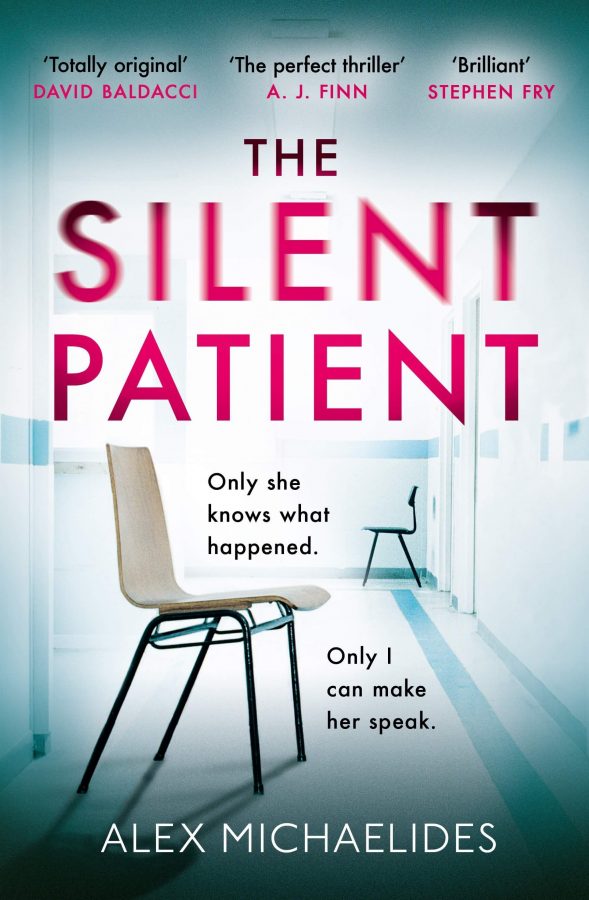
What advice would you give to young Greek writers?
I can’t advise people creatively. What I can say is that every day I was working on that book, I felt like giving up. The voices in my head would say ‘it’s not good enough’. I nearly quit every day. So now on the other side of this, I think: ‘If I had given up, I wouldn’t be where I am now’.
So even now, with my current book, every day is a battle. I wrote a book that people really like and now I feel I don’t know how to write a sentence. What matters is perseverance and not giving up, a bit like Odysseus.
Or Sisyphus?
Oh God, I hope it’s not Sisyphus Groundhog Day, but actually my third book is based on the myth of Sisyphus. I feel for me it’s like Stephen King said that ‘trying to write a novel, is like trying to cross the Atlantic in a bucket.’ It’s small progress, that goes on forever and you can’t see the end of it. That’s where I am right now, in the middle of the Atlantic with my new book and all you can do is keep going.
Is it a tortuous, solitary process?
Yes of course, the writer Hanif Kureishi said that to be a writer you have to have a very solitary existence.
My favourite phrase that I’ve come up with is that ‘I hate writing, but I love having written.’ That’s the biggest truth of my professional life. I don’t think I spoke to anybody all summer while writing The Silent Patient. I just wrote and wrote.
When I was writing the last book, I would walk on Hampstead Heath every day, recording myself on the phone and I became the character for about 3 months. Right now, I do a chapter a day, and if I do my chapter, I can sit on my couch and feel ok. If I haven’t done my chapter, it’s misery.
What’s your biggest fear?
I met my old professor after the book launch and told him that what I feel now is some validation. Which at my age, 41, is very nice. My professor said, ‘At any age, validation is great.’ It is fabulous, particularly when you’ve been writing for 20 years and never had any.
My biggest fear was that I used to believe that the idea that I was talented was self-delusional and not self-belief. When I was 20, it was self- belief. When you are 40, it’s self-delusion. But that goes away every time somebody says they’ve read the book…I was always very ambitious. I wanted to win an Oscar at 13! I’m more ambitious now. I want to get validation and then after that I want a garden and dogs and someone to love me.
Which fictional character would you like to be?
I watched ‘The Inheritance’ by Matthew Lopez and it was like ‘discovering Tennessee Williams before the alcoholism and the speed injections got to him’. It had such emotional clarity. Any of those characters I would wish to be. I felt they were held in such awareness and love and warmth.
All I did after the play was cry and drink vodka. I went back to my flat and sat up all night writing because he inspired me to be a better man and a more honest writer, he inspired my third book. I’d like to be a character in a Matthew Lopez play because he loves them all, even the bad characters.
What’s next for you? I know there’s another book on its way …
I don’t want to be a one-hit wonder. My worry is you have a lifetime to write one thing, and the next one might be a disaster. I’d like to have a career as a novelist, but also after having made 3 films, I wasn’t happy with how any of them turned out, so I’d like to make a really good movie. The Silent Patient is being adapted into a movie and I am doing the screenplay for it. It’s going to be a very interesting experience and I’m going to learn a lot.
In this difficult industry, who has been there for you?
Uma Thurman has been so kind to me. We met because I wrote a film that she made, and the production was a disaster, not her or my fault, just the way it was. She took the time to explain to a budding writer, how things do or don’t work. She said to me: ‘Every scene has to be an attempt at an iconic image.’ So, I learned from her.
I told her that I was writing ‘A Silent Patient’ and she told me that Alicia should be a painter. She helped me re-imagine the story. I learned more from her, than 3 years at film school. The debt of gratitude I feel towards her is massive. She’s one of the most talented people I’ve met.
It’s no coincidence that the only time Quentin Tarantino has given a story credit to someone other than himself was for the two Kill Bill’s, where he said ‘story by QT and UT.’ Having worked with her and seen how much she did for me, I totally get it. She should be a director herself, she has a poet’s imagination and a visionary mind. She’s been a kind friend. I grew up loving her, she’s like Marilyn Monroe to me. It’s in my head before I die, to write a really great part for Uma and see her do it.


